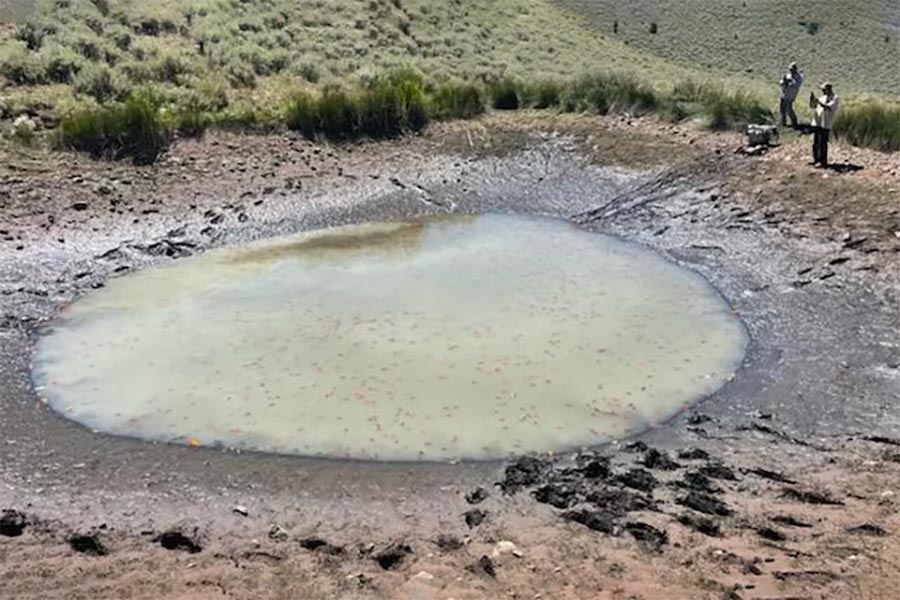WARNING – Stop Releasing Your Pet Fish into the Wild
Eugene L. 09.13.22

I think this is the third time I’m writing about released pets in the wild this year, but I’ll say it again do not release your pet fish into your local waterways. The Utah Division of Wildlife Resources is reminding folks that it is highly illegal and harmful to dump unwanted pet fish into your local ponds and waterways. It is also illegal and potentially harmful to move fish you’ve caught from one waterbody to another waterbody.
DWR Biologists across the state of Utah do surveys across the state every spring and fall. They survey various lakes and streams to get data about the fish in those waterbodies, checking their weight, condition, and population numbers. This year however during their surveys, Utah Division of Wildlife Resources biologists discovered an oscar fish (Astronotus ocellatus) in the Millrace Park Pond. These fish are a cichlid originally native to tropical South America and are a common pet fish. They also found a variety of other exotic fish in several other community ponds in the Salt Lake Valley.
DWR biologists also discovered hundreds of goldfish (Carassius auratus), also probably pet fish, in a pond in the Mail Draw Wildlife Management Area on August 29th. This pond is a watering hole for local wildlife in the WMA and is not a fishing pond.
When a fish is illegally introduced into a pond, stream or lake, it can have several negative effects on that fishery, including:
- Illegal fish species can prey on and outcompete other fish species, including sportfish, native fish and endangered fish species.
- The new fish can introduce disease because they weren’t properly tested before being dumped into that waterbody.
- The new fish can negatively impact water quality.
“Illegal fish introductions seldom improve fisheries — instead, illegal introductions typically ruin fisheries and threaten the species that live there,” DWR Sportfish Coordinator Randy Oplinger said. “It is also illegal in Utah and can result in a class A misdemeanor.”
Over the past two decades, several fisheries have been severely impacted by illegal fish introductions.
- In 2005, illegally introduced Utah chub were discovered in Scofield Reservoir. That resulted in the DWR having to stock several additional species — including tiger muskie and wiper — to reduce the number of chub in the fishery. It also necessitated a slot limit for trout.
- In 2006, illegally introduced walleye were discovered in Red Fleet Reservoir. The walleye damaged the quality and stability of the fishery, resulting in a required rotenone treatment in 2015 to rid Red Fleet of the walleye.
- In 2016, illegally introduced walleye were discovered in Echo Reservoir. That resulted in the DWR having to stock sterile walleye to help decrease the number of actively reproducing walleye in the fishery.
- Illegally introduced walleye and yellow perch were discovered in Big Sand Wash Reservoir in 2016, as well. That also resulted in the DWR having to stock sterile walleye to help decrease the number of actively reproducing walleye in the fishery.
- In 2017, illegally introduced Utah chub were discovered in Mammoth (Huntington) Reservoir. That resulted in the DWR having to stock splake in the reservoir in 2020 in order to reduce the number of chub in the fishery.
- In 2018, illegally introduced yellow perch, bluegill and green sunfish were discovered in Kolob Reservoir. The fish wreaked havoc on the fishery, resulting in a required rotenone treatment later that year.
- Over the past 20 years, DWR biologists have also found countless examples of aquarium fish that were dumped into ponds, streams or lakes across Utah.
“It is very expensive and takes a long time — often requiring rotenone treatments that kill all the fish — to restore these waterbodies after fish have been illegally introduced,” Oplinger said. “Please help our native fish species and maintain quality fishing in Utah by never dumping a fish.”
Utahns are encouraged to call 1-800-662-3337 to report any invasive fish they find, or if they see anyone illegally introducing fish into a waterbody or trying to relocate live fish. Learn more about the consequences of illegal fish introductions by visiting the “Don’t Ditch a Fish” page on the DWR website.